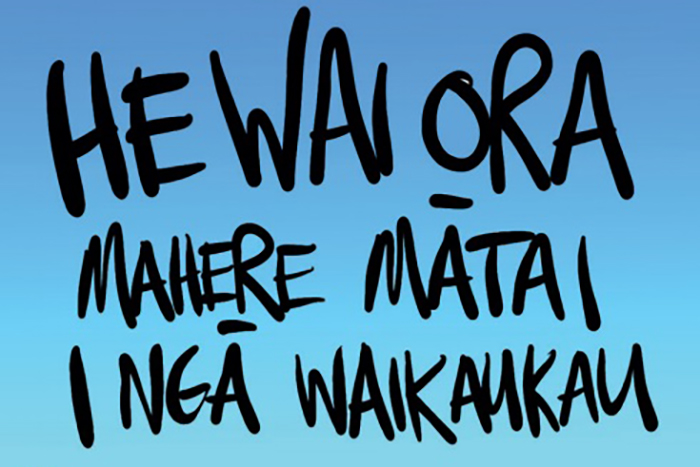
ESR Māori Impact Scientist Georgia Bell (Ngāti Maniapoto, Pare Hauraki and Ngāti Pu) has inspired pupils from Te Kura Kaupapa Māori o Te Perehuia in Mahia about the value of science, by working with them to develop books conveying important water quality testing protocols that will help improve the health of local awa (rivers).
The books, He wai ora mahere Mātai i ngā Waikaukau – Is Our Water Safe for Swimming?, apply a Te Ao Māori lens to raise awareness about testing the safety of drinking water as well as local awa used for gathering mahinga kai (traditional harvested foods), and for leisure activities like kau (swimming).
Georgia says developing the books was a co-learning experience between herself and the tamariki, and the end result is a great example of what we can achieve when we involve young people in science while anchoring our communities in Te Ao Māori with western science.
“The pictures in the books also depict the children from Te Kura Kaupapa Māori o Te Parehuia as cartoon characters, with scenes from Waipiata, the awa that we worked on with the kids.”
The books are a visual aid containing a protocol depicting the flow of work required to test water for the faecal indicator E. coli, an indicator of faecal contamination. The bacterium itself is harmless but other bugs in faeces can make people very sick.
“He kura takahi te whenua, he kura taiao,” says the kura’s principal Arna Whaanga.
“Te Kura Kaupapa Māori o Te Parehuia was established by our whānau only five years ago, as we knew we had to prepare our tamariki for their future.
“There are no better kaitiaki then ourselves to take care of our mana moana & mana whenua. We are grateful to have a healthy ongoing relationship with ESR and in particular Kõka Georgia. As a marae-based kura we know we are unique because there is no other kura like ours for Rongomaiwahine mokopuna.
“Our Indigenous knowledge is at the forefront of our day to day classroom where we are not afraid to step outside. ESR has helped navigate this and provided mainstream science and technology for our tamariki to grow. There are many environmental concerns in Mahia and to prepare them it is only right that we align our tamariki with the best.
“He manako te koura, e kore ai!,” says Ms Whaanga.
“He manako te kōura i kore ai – a crayfish won’t jump in your net, just because you wish it in there.”
Georgia was raised in Whangamatā and holds a Bachelor of Science, a Postgraduate Diploma in Science in Microbiology and Immunology and a Master of Marine Science from the University of Otago. She was awarded a Science New Zealand Early Career Award in 2020, reflecting the contribution she’s making to embed mātauranga Māori with other science since joining ESR three years ago. She plays a key role in the Māori Impact team leading outreach and partnership projects with kura, hapū, iwi, and communities.
Georgia says the best part of her job at ESR is learning from and working with tamariki and seeing their enthusiasm about how science can be harnessed to address big issues like water quality, and how they have the ability to apply their education to their local environments.
“During this project and while developing the books, we had tamariki from age five to 12 talking about E. coli, what the implications of it are, and whether they can swim in water where this pathogen is present.
“I have learned the value of sharing science concepts with tamariki, rather than overlooking them because of their age. Tamariki and rangatahi are great teachers, passing on the knowledge they acquire to their whānau, their hapū, their iwi, their friends, and their classmates – as well as scientists.
Central to Georgia’s work as an ESR kaipūtaiao (scientist) is working with Māori communities throughout Aotearoa New Zealand and collaborating with iwi to share the benefits science can bring.
“This helps empower communities to harness science for testing water quality. Our Māori communities are the ones that are on the ground doing this mahi already, they have the knowledge, passion and aspirations. They know how best to do the mahi; it is our job to ensure that they are best resourced and have the tools available to them.
“I’m so pleased to be able to visit grass roots communities and share science with them and find benefits for all New Zealanders as we co-learn together.
Outreach like this means we’re sharing the knowledge and practices with Māori, rural communities, and other groups that may otherwise not have had such access.
“Everyone’s a scientist. You don’t need a lab, you just need to keep asking questions about the world,” says Georgia.
Further information:
- Mātauranga Māori is a modern term referring to Māori knowledge, and the Māori way of being and doing that is not static but always evolving. This includes the knowledge about and from ancestors and the knowledge being continually developed by Māori today.
- There are three versions of the books, including in te reo Māori and English, which feature illustrations based on the drawings of the tamariki.
- The books are free to download from ESR’s website.
- You can find out more about Georgia’s work and her being awarded the Science New Zealand Early Career Award on ESR’s website.